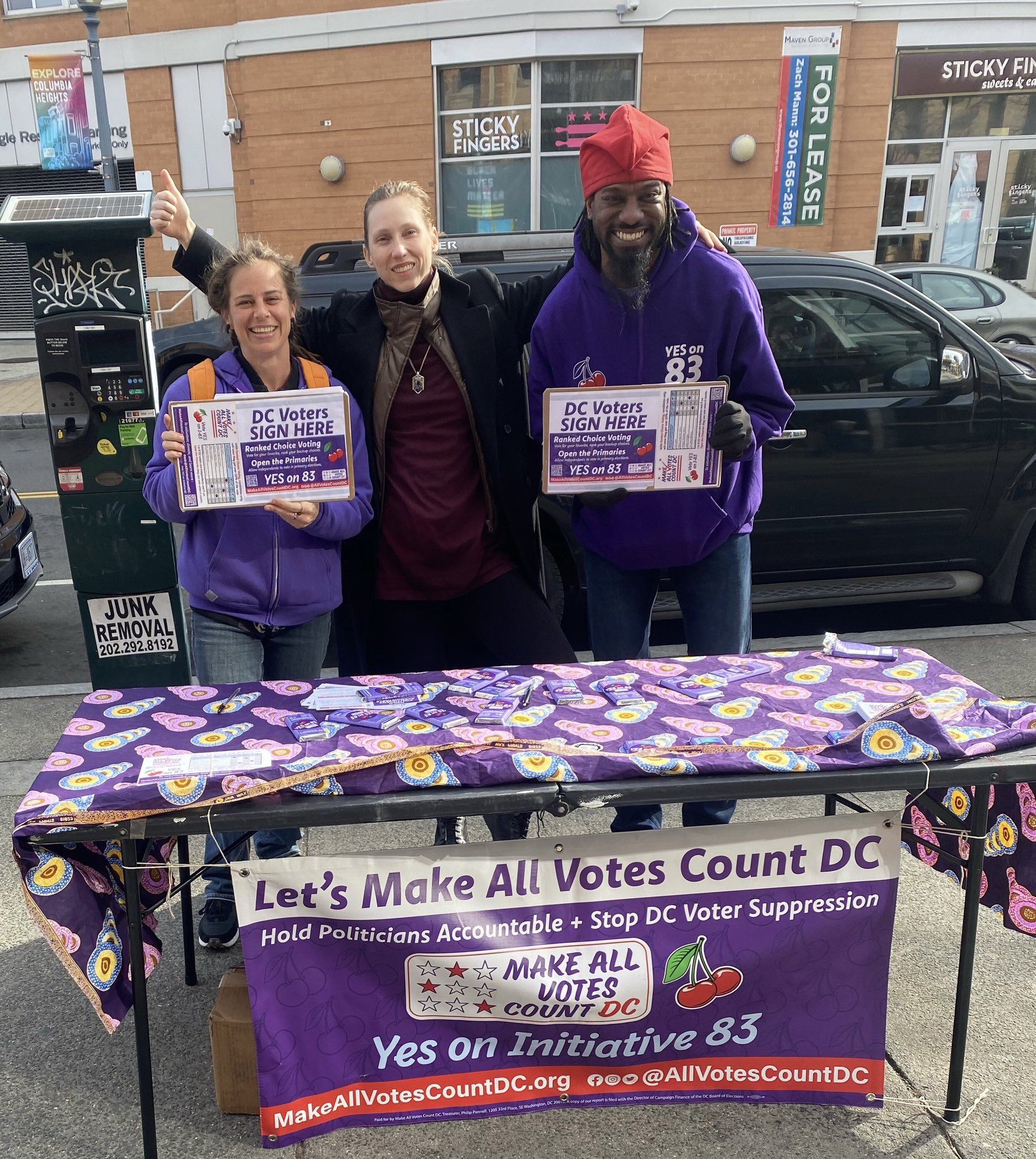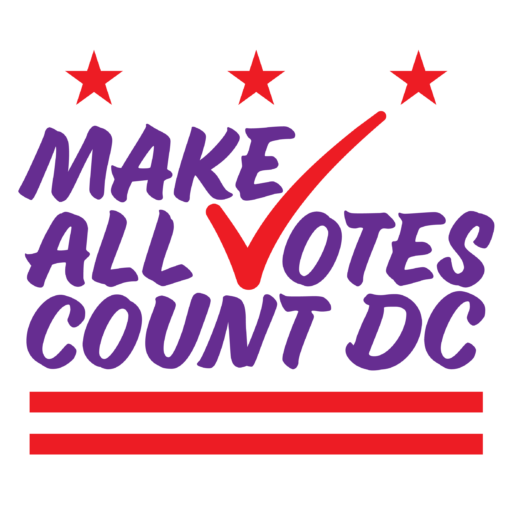
FREQUENTLY ASKED QUESTIONS
Below you will find common questions and answers about Ballot Initiative #83. If you have a question that you do not find below, please fill out our contact form.
Q. What is Make All Votes Count DC?
A. Make All Votes Count DC is a ballot initiative campaign created to make it easier to hold politicians accountable and stop DC voter suppression. We want to hold politicians accountable by implementing Ranked Choice Voting to make sure they have to get over 50% of the vote to win. And we are stopping DC voter suppression by Opening the Primaries to Independent Voters, which will allow nearly 1 in 6 DC voters the right to vote in the most important DC elections. Our campaign was created by neighbors across the city to introduce and pass what is now known as Ballot Initiative #83. The campaign committee was created on May 18, 2023, by Proposer Lisa D. T. Rice and Treasurer Philip Pannell. When the legislative text was submitted to the DC Board of Elections (DCBOE) in the summer of 2023, our original title for the proposed law was the “Make All Votes Count Act of 2024,” and after it was deemed proper subject matter by the DCBOE, the proposed law was then renamed by the DCBOE to “Ranked Choice Voting and Open the Primary Elections to Independent Voters Act of 2024.” (Click here to read the legislative text of Ballot Initiative #83) The campaign committee name remains Make All Votes Count DC and is registered with the DC Office of Campaign Finance.
Q. What is Ranked Choice Voting?
A. Ranked Choice Voting (RCV) is a different voting system that makes it easier to hold politicians accountable. Our current system forces voters to pick one candidate, and voters often get told “don’t waste your vote, they’re a spoiler” or “hold your nose and vote for the devil you know”. Ranked choice voting allows you to vote for your favorite 1st, and rank your backup choices 2nd, 3rd, 4th, up to 5th. Your vote stays with your first choice. If your 1st choice is in last place, your vote automatically moves to your next choice. A candidate only wins once they get over 50% of the vote. Our current system makes it hard to hold politicians accountable since they don’t need to get over 50% of the vote. It’s hard to “vote someone out” if they are unpopular, as a bunch of candidates run against them and split the vote. With ranked choice voting, it’s easier to hold politicians accountable because candidates have to get over 50% to win. This makes it smart for candidates to build a coalition and work harder to get more of our votes. Click here to watch a video to see Ranked Choice Voting in action.
Q. Can I still vote for only one candidate with Ranked Choice Voting?
A. Yes, if you wish to only give one candidate your #1 ranking and leave the rest blank, feel free.
Q. What does “Opening the Primaries to Independent Voters” mean?
A. Currently, the District of Columbia operates a “closed” primary election. This means only voters who belong to DC’s official political parties are allowed to participate in the primary election. Currently, 76% of all registered voters in DC are registered as Democrats. The second largest voter registration category is “no party affiliation” otherwise known as “independent,” meaning these voters do not belong to any of DC’s official political parties. If you combine all the registered Republicans, Statehood Greens, and Libertarians in DC, there are still two times more voters who are registered as independent. These independent voters– 1 out of 6 voters in DC– cannot participate in the most important elections. Ballot Initiative #83 will allow independents to vote in the taxpayer-funded party primary of their choosing.
Q. Why not join one of DC’s official political parties?
A. There are many reasons why a voter might not want to belong to a political party. It is the default selection if you are automatically registered to vote. More and more young people are not identifying with a party and might need time before they would want to join a party. Some people have careers that require a level of independence like government jobs, lawyers, and journalists. They do not want their party affiliation to be a rationale for someone to question their work. Some voters have values that align with portions of one party and portions of another party, so they don’t want to belong to a single party but remain independent. Some incarcerated neighbors are in prison across the nation and do not want to be registered as a Democrat as it might be dangerous for them. Some DC Democrats have left the party as the national Democrats have continually failed to fight for our right to statehood and self-determination. These voters should not be denied the right to participate in all publicly funded elections.
Q. Why does Ballot Initiative #83 combine BOTH ranked choice voting and opening the primaries to independent voters? Why not two ballot initiatives?
A. The Make All Votes Count DC campaign is a coalition of different perspectives who agree that it’s time for a big change. The campaign also liked other big changes, like the Final Four system in Alaska, but the Home Rule Charter prevents more than one candidate from a political party from being on the same general election ballot. This cannot be changed through a voter-initiated ballot initiative. Neighbors thought this was the most impactful (and legally allowable) way for us to increase turnout and make a fairer system, where politicians have to work harder for our votes.
Q. Would Ballot Initiative #83 allow Republicans to vote in the Democratic primary? Or permit members of other political parties to vote in a different party’s primary election?
A. No, Ballot Initiative #83 will only permit DC’s independent voters (registered as “no party” affiliation) to choose a party to participate in the primary election. They will not be required to join the party to cast a ballot in the primary election and will remain registered as an independent. A registered Republican will only be permitted to vote in the Republican primary. Just as a Democrat will only be able to vote in the Democratic Party’s primary. The current deadline for a DC voter to change parties or leave a party and register as an independent is 21 days before an election. Ballot Initiative #83 does not change this deadline. Therefore under current law a Republican can already join the Democratic Party 21 days before the election. Ballot Initiative #83 simply empowers DC’s independent voters and gives them the option of participating in the primary election.
Q. Will Ballot Initiative #83 require independent voters to vote in the primary election?
A. No, just like all other voters who belong to DC political parties, independent voters are not required to participate in the primary election. Ballot Initiative #83 will only give independent voters the option of participating in the primary election.
Q. Primary elections also allow party members to vote for party leaders, including members of the party’s presidential nominating conventions. Will Ballot Initiative #83 allow independents to vote for these people?
A. No, Ballot Initiative #83 only permits independent voters to vote for candidates to DC’s elected offices. Specifically, only Delegate to Congress, Mayor, Attorney General, Chairman of the DC Council, Shadow Representative, Shadow Senator, At-Large Councilmembers and ward-level Councilmembers. Ballot Initiative #83 does not permit independents to vote on the intra-party affairs, like committee member slates for conventions or party committee persons. A special party ballot will be prepared for independent voters so they cannot vote for party officials.
Q. How much is this going to cost DC?
A. According to the Chief Financial Officer, they estimate it will cost about $1.5 million dollars over the first 5 years. Our election machines are already compatible and only need a free software upgrade and a new ballot design. Much of the funds relate to educating voters, which is already the mission of the DC Board of Elections. The Make All Votes Count DC campaign hopes to educate voters during our petition circulation effort as well as leading up to the election. You can read the Fiscal Impact Statement by clicking here.
Q. I thought ballot initiatives were prohibited from allocating funds. How is Ballot Initiative #83 legal?
A. Ballot Initiative #83 is legal because it does not force the DC government to allocate funds for the implementation of the law. It will be up to the DC Council’s FY2025 and FY2026 budgets to provide the DC Board of Elections extra funds to implement Ballot Initiative #83. The DC Council often passes laws that are not fully funded, and Ballot Initiative #83 is no different.
Q. Where I can sign the petition to get Ballot Initiative #83 on the ballot?
A. The campaign has begun collecting the required 30,000 signatures of DC voters before July 2024 to get Initiative 83 on the November 2024 ballot. You can find campaign staff and volunteers at grocery stores, metro stops, farmers markets, and festivals all spring. Please reach out to SignThePetition@makeallvotescountdc.org, call the campaign office at 202-733-4640, or check out our social media accounts to connect with us. If you want to help gather signatures, sign up for an upcoming petition circulator training.
Q. How much can I donate to the Make All Votes Count DC campaign committee?
A. Unlike traditional campaign committees who seek to elect a candidate, which caps on the amount that can be donated, ballot initiative campaign committees can take unlimited contributions from individuals and businesses. The campaign committee can also receive funds from 501c(3) non-profit organizations. The campaign must regularly report all monetary donations as well as in-kind contributions. The campaign has three methods to receive donations that are outlined our donation page.
Have a question not listed here?
Send an email to Questions@MakeAllVotesCountDC.org
